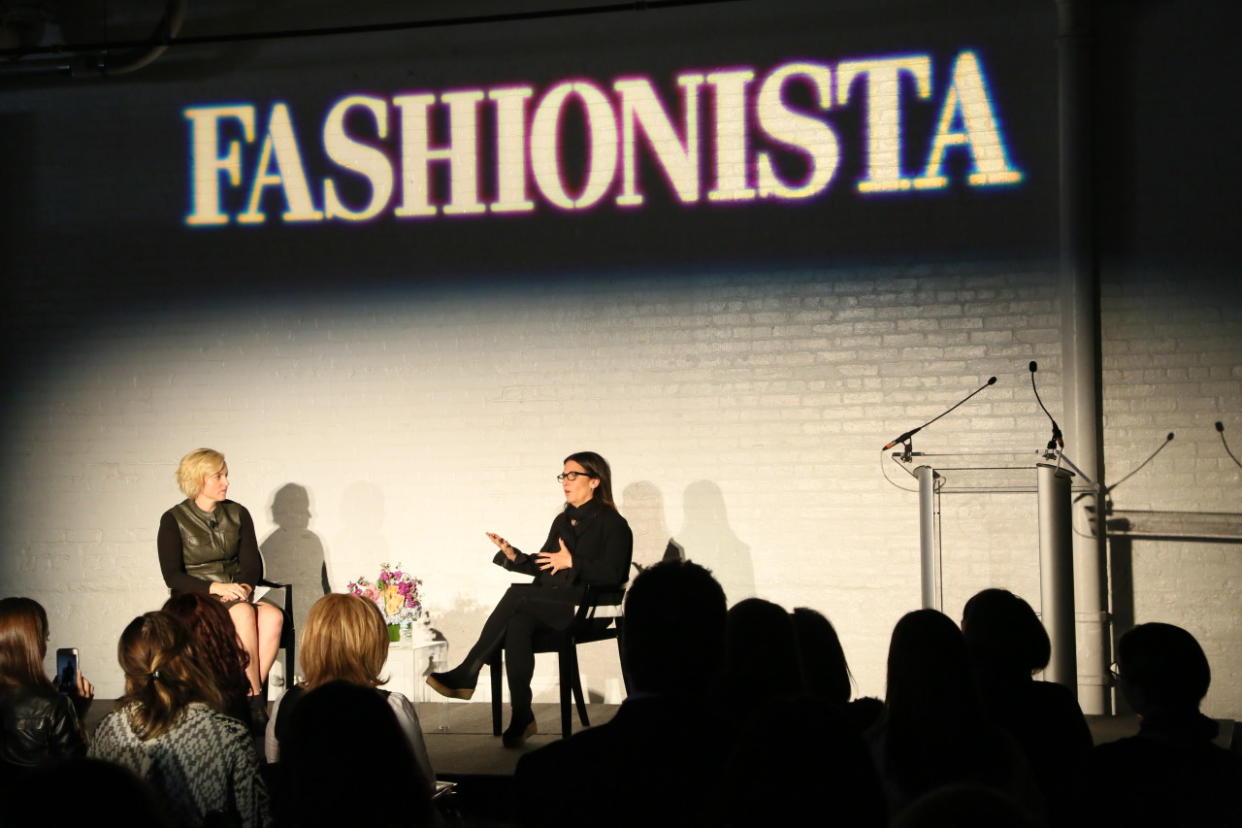8 Vital Takeaways from Fashionista’s ‘How To Make It In Fashion’ Conference

Bobbi Brown shares words of wisdom at Fashionista’s ‘How to Make It in Fashion’ conference. Photo: Meghan Uno for Fashionista
From magazine editors sharing their personal lives on Instagram to runway shows being live-streamed for the general public, the fashion industry is now more transparent than ever. But while all those innovations may make the industry feel more accessible, building a career in fashion is as tough as ever. Whether you’re interested in the design, business, or editorial aspects of fashion, there’s often no clear-cut path towards a dream career—and, truth be told, watching The Devil Wears Prada 10 times over isn’t much of a resume builder.
Enter Fashionista’s How To Make It In Fashion conference, which, for the past several years, has been providing valuable insight to aspiring industry players, straight from the people who’ve made it, themselves.
Friday’s day-long event in New York City, which included keynotes from beauty entrepreneur Bobbi Brown and designer Marissa Webb, covered everything from new media retail trends, design to wellness, and of course, internship advice.
Read on for the 8 tidbits we’re taking with us.
1. Choose your internships wisely. It’s no secret that internships are a crucial step to gaining experience. Ruthie Friedlander, the deputy digital editor of Elle.com, stressed the importance of picking your internship carefully. “Don’t do it just for a line on your resume,” she said. “Choose someplace you really care about and really want to digest, as opposed to having a list of places you just want to check off.”
2. Make the most of said internships. Internships might lead to a job interview, but they’re not the be-all-end-all. Julia Rubin of Racked said that she looks for editorial candidates with who can actually demonstrate their skills, rather than those with a resume filled with internships and nothing to show for them. “For me, writing for your school paper or magazine is the most important thing. Show me that you can report and really get to the point to the story.” In other words, having concrete experience means more than coffee runs and sample requests.
3. A strong social media presence is crucial. Your Instagram account may not come up during a typical HR interview, but keep in mind that people are probably checking up on you after. As GQ’s senior digital editor John Jannuzzi put it bluntly, “Your personal brand is way more important than it should be.”
In certain instances, your follower count could be the thing that gets you the gig. Explained Friedlander, “All things being equal, if you are up for the same job as someone else and you have a big following, then you’ll get the job.” At the same time, be thoughtful about what you post—it should go without saying that offensive or inappropriate content will only hurt you.
4. Surround yourself with an awesome, inspiring team. Regardless of what sector of fashion you happen to be in, this is a collaborative business—and it’s important to get along with your co-workers. To avoid burning out, find a company where the work feels divided equally. As Bobbi Brown explained, “I hire really good people to do things I’m not good at.” Mutual respect, as well as complementary skill sets, are critical.
5. Your resume isn’t everything. Obviously, your resume is important—but it isn’t necessarily the deciding factor on whether you’ll get the job. Bobbi Brown admitted that she doesn’t even look at a potential candidate’s resume before meeting him or her. “I want them to walk me through their career in person,” she explained.
Then there’s John Jannuzzi, who lets an applicant’s search engine results do the talking. “Google is way more important than your actual resume,” he said.
6. Find a mentor. Designer Tanya Taylor admitted that she had no fashion connections when she was starting her eponymous label. Her strategy? Reach out to people whose work she admired, and ask them for their advice. “I knew I had to have no fear when I was starting out. I emailed everyone and had a lot of informational coffees.” The ideal mentor is empathetic and understands your aesthetic. “Find people who want to support you and who get what you’re saying,” she explains. “You need someone who understands the spirit of what you want to do.”
7. Being the best is more crucial than being first. When you’re making a new product, it’s tempting to assume that faster speed equals more customers. But, as Bobbi Brown revealed in her keynote speech, quality trumps all. “I never try to be first to market; I just try to be the best,” the founder and COO of Bobbi Brown Cosmetics said.
Jonathan Simkhai, creative director of his eponymous label, agreed—saying, “It’s important to take your time, and grow slowly and organically.”
8. Ask for feedback. It doesn’t matter if you’re a writer, a small business owner, or a designer: your name is attached to everything you do, so you want it to reflect your vision. If you’re unsure, ask for input from others. As Tanya Taylor puts it, “Asking an editor or someone you trust for feedback is one of the best things you can do when first starting out.”
Follow us on Facebook, Instagram, and Pinterest for nonstop inspiration delivered fresh to your feed, every day.

